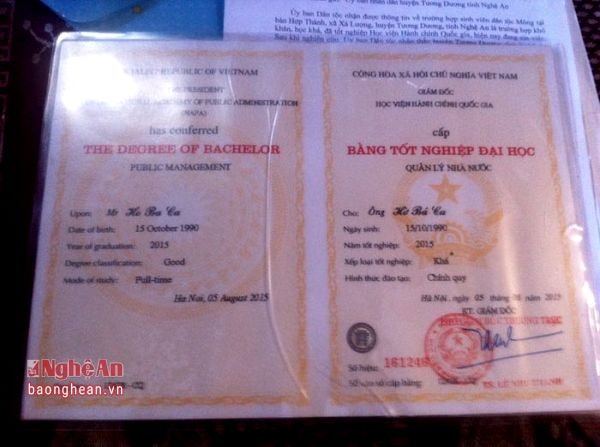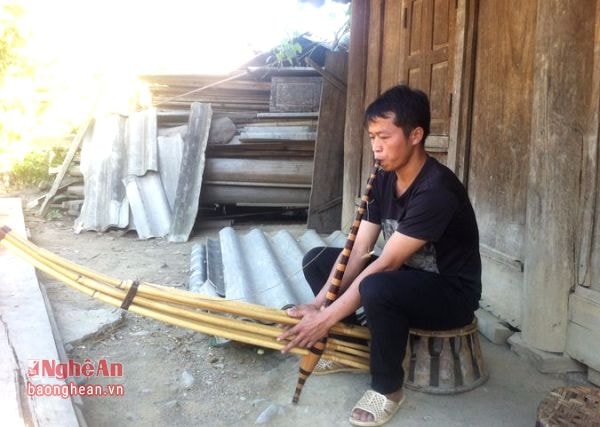200 unemployed graduates - what is the cause?
(Baonghean.vn) - The lack of staffing quotas is the main reason given by districts when discussing the cause of unemployment among graduate students. Over the past 7 years, 200/439 graduate students have not found jobs after graduation as initially committed.
College Degree and Answer: No Quota!
 |
| After graduating with a good degree, he brought his resume everywhere to apply for jobs, but the answer Ho Ba Ca always received was "no quota". |
Seven years ago, Ho Ba Ca became the hope of his family when he overcame many candidates to become a student in the selection process. That was in 2010, a time when very few Mong ethnic students went to high school, let alone passed the university entrance exam. Therefore, the fact that this Mong ethnic boy from Hop Thanh village, Xa Luong commune, Tuong Duong district became a student of the National Academy of Public Administration brought joy to his whole family and clan.
 |
| Even though there was an official dispatch from the Central Ethnic Committee requesting the People's Committee of Tuong Duong district to consider Ho Ba Ca's case, it still could not be done. |
After 5 years of studying hard, graduating with a good degree, applying for jobs everywhere but the answer Ca always received was "no quota". I think my degree is such a waste, I hope to fulfill my dream, to be recruited to work in the field I was trained for, not to be able to work and waste so much money of my family as well as the State - Ho Ba Ca shared.
Ho Ba Ca's feelings are also the common feelings of unemployed graduates. Vi Van Hoi in Ang village - Xa Luong commune - Tuong Duong district, although he graduated from the Mathematics department of Hue University of Education more than 4 years ago, had to stay home to help his mother with the rice milling business, earning extra money to cover household expenses. He invested hundreds of millions of dong in his children's education, and now after graduating, he has applied for jobs everywhere and is told that there are no positions available. "We just hope that our superiors will pay attention to creating jobs for children from the mountainous areas when they graduate," said Vi Thi Vinh, Hoi's mother, choking with emotion.
Vi Thi Nhan's case is quite special. In 2006, when her family was living in the Ban Ve hydropower resettlement area, Nhan was sent by Tuong Duong district to study at the National Economics University. After graduating in 2010, her family migrated to Muong village - Ngoc Lam commune - Thanh Chuong district. Due to the localities passing the buck to each other, up to now, after 6 years of graduating, Nhan has not been accepted. Nhan confided: "Now I don't know what to do, I can only wait. With all the money, I had to sell buffaloes and cows to get money for school, I hope the authorities will pay attention to my case, arrange for me to have a job to stabilize my life".
 |
| After 4 years of studying, graduating without a job, frustrated with waiting for a job, Vi Thi Nhan got married, opened a grocery store to make a living. |
After many petitions, Tuong Duong district responded in writing: The reason why the locality did not recruit is because Vi Thi Nhan no longer has a household registration here. Thanh Chuong district affirmed that Decree 134 of the Government clearly stipulates that the locality that sends students must be responsible for arranging jobs. Mr. Nguyen Van Que - Chairman of Thanh Chuong district People's Committee affirmed: In recent years, Thanh Chuong district has not had any students sent to study because there is no need, but when resettled people return, Tuong Duong district sends some students to study, so when they return from school, the responsibility belongs to Tuong Duong district to arrange, because the locality that sends students is responsible for arranging jobs. As for Thanh Chuong district, if there is a shortage of job positions, if we deem it appropriate, we will recruit.
 |
| Every day after work in the fields, Ho Ba Ca only knows how to play his panpipe, his dream of becoming a civil servant is gradually fading away. |
Mr. Lo Thanh Nhat - Vice Chairman of the People's Committee of Tuong Duong district explained: Even if we wanted to arrange a position, we couldn't because there was no establishment. In the case of Vi Thi Nhan, it's not that we didn't want to recruit her, but because the accounting major that Ms. Nhan studied in Tuong Duong district didn't have a demand. "Moreover, how can the quality of the students who are recruited be as good as the ones who take the exam themselves? The Law on Civil Servants requires them to take the exam, even if we have given priority but they are not as good as others, we have to accept it, what can we do?" - Mr. Lo Thanh Nhat said, at the same time admitting that these are historical problems. Although there are no job positions, they still follow the trend, so most majors such as agriculture, forestry, pedagogy and law are studied by a lot of students and when they graduate, it is very difficult to recruit them because there is no demand.
More than 200 unemployed students
 |
| Unable to find a job, Hue University of Education graduate Vi Van Hoi in Ang village, Xa Luong commune (Tuong Duong) returned to his hometown to work as a rice miller to earn extra money to help his parents. |
The lack of staffing quotas is the main reason given by the districts when talking about the cause of this situation. According to statistics, from 2005 to 2014, the whole province had 884 students recruited, of which 602 were university students, 147 were college students and 135 were intermediate students. And in the past 7 years, out of 439 recruited students after graduating, the whole province still has more than 200 recruited students who have not found jobs as initially committed. This not only wastes human resources but also wastes the State budget. On average, in 4 years of study, Nghe An province has to spend up to 100 million VND for 1 recruited student, including: scholarships, tuition, books, etc.
Ms. Nguyen Thi Tuyet Mai - Vice Chairman of Que Phong District People's Committee said: It takes 4 years for students to go to school, at first there is a shortage of those positions. "However, during the time the students go to school, these positions require staff to work, forcing us to bring in other people to replace them. But when the students return, we cannot fire them, that's why it's difficult" - Ms. Mai explained.
Whose responsibility is it?
Localities also admit that for this situation to happen, the responsibility lies largely with the policy implementation level. In addition, with the implementation of Resolution 30a of the Government since 2008, ethnic minority children in the 30a region are registered for direct admission to colleges and universities. Meanwhile, the recruitment method is easy, the education sector only considers admission based on scores and academic records. Therefore, the responsibility also belongs to the training institutions.
Meanwhile, the Nghe An Department of Education and Training said that, in addition to the reasons that the districts have not set up recruitment targets closely and seriously, there is also a lack of close coordination between levels, sectors and localities. In addition, the learning outcomes of recruited students are still poor, and recruitment between Decree 134 and the Law on Civil Servants is not consistent. Mr. Thai Huy Vinh - Deputy Director of the Nghe An Department of Education and Training affirmed that: The education sector has no responsibility, the responsibility of job arrangement belongs to the districts sending students to study and the Department of Home Affairs.
Mr. Luong Thanh Hai - Head of the Ethnic Minorities Committee of Nghe An province also affirmed: Joint Circular No. 02 issued on September 21, 2014 between the Ethnic Minorities Committee and the Ministry of Home Affairs clearly stipulates: All ethnic minority students studying at universities and colleges under the recruitment system will be arranged jobs by the locality upon graduation. After graduation, the recruited students are recruited without taking civil servant and public employee exams. Every year, the People's Committees of the provinces submit to the Provincial People's Council the number of reserve positions as a basis for recruitment and placement into civil servants and public employees to ensure a reasonable ratio. Mr. Hai said that the responsibility belongs to the provincial-level sectors, that is, they have not consulted well with the Provincial People's Committee and the Provincial People's Council to properly implement Joint Circular No. 02.
The recruitment policy is outdated.
Because the determination of annual recruitment quotas of districts does not closely follow the actual recruitment needs, the supply exceeds the demand. Along with that, in recent years, due to the lack of increased staffing, the sectors and localities are restructuring and streamlining the staffing, so the job placement for recruited students is facing many difficulties. Moreover, the professional and technical capacity of recruited students is still limited, so it is even more difficult to find a job.
"In my opinion, the election form should be abandoned based on the above reality. It should only be held for ethnic minorities such as the O Du, Choang... because these ethnic groups have a population of less than 10,000 people" - Ms. Kha Thi Tim - Vice Chairman of the People's Committee of Con Cuong district shared her opinion.
Besides, the students themselves need to realize that the fact that the government creates the best conditions for them to study at top universities is already a privilege. After graduating, instead of waiting for the government, they can completely look for other job opportunities themselves.
Whatever the reason, the current situation of unemployed students is causing a huge waste. Moreover, allowing this situation to happen also makes a preferential policy of the Party and the State lose its inherent meaning. Faced with this situation, in recent years, the establishment of quotas for sending students to study abroad has been gradually adjusted down by Nghe An province, and in the past 2 years, the whole province has not sent any cases.
| Comrade Le Xuan Dai - Member of the Provincial Party Committee, Permanent Vice Chairman of the Provincial People's Committee said: The Provincial People's Committee has directed the Department of Home Affairs and related sectors and districts to prioritize the reception and recruitment of ethnic minorities and students under the nomination system; Reduce the number of nominations, improve the quality of candidates sent to study. The Provincial People's Committee will assign the Department of Home Affairs to coordinate with the Ethnic Committee and related sectors to advise on the development of a plan to implement Decision No. 402 of the Prime Minister, in which, the proportion and reasonable structure of ethnic minorities in State administrative agencies and public service units will be determined as a basis for recruiting ethnic minorities and students under the nomination system. Assign the Department of Home Affairs to review the learning quality of students at educational institutions. |
Charter
| RELATED NEWS |
|---|

